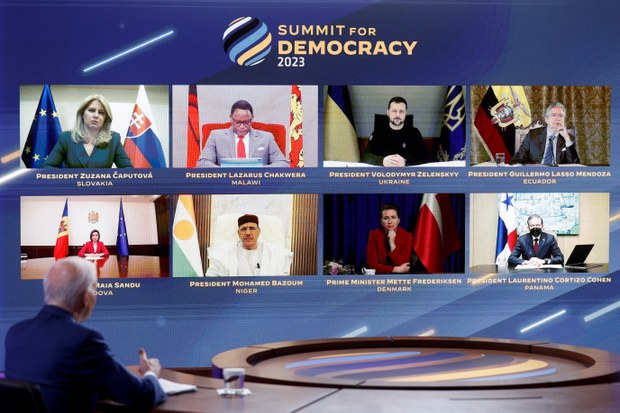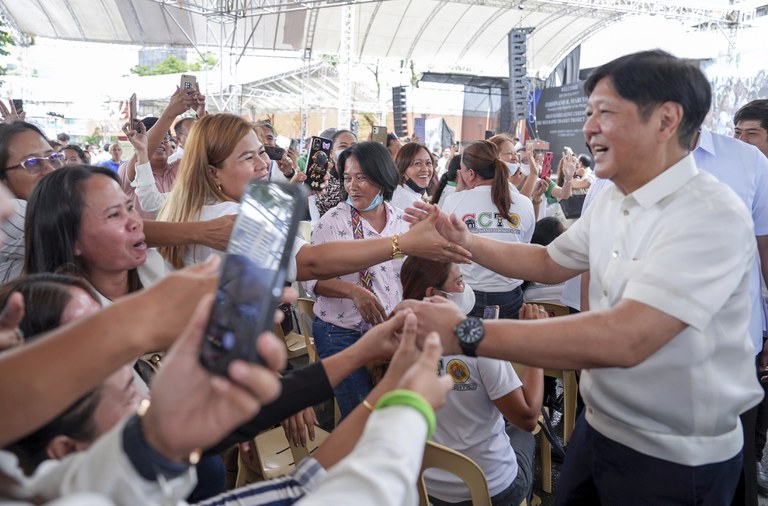Philippines dissents on ICC reference in declaration from US-led democracy summit
2023.03.30
Manila
 Leaders from Slovakia, Malawi, Ukraine, Ecuador and other countries appear on a screen as U.S. President Joe Biden delivers remarks during a virtual Summit for Democracy, which he hosted from an auditorium on the White House campus in Washington, March 29, 2023.
Leaders from Slovakia, Malawi, Ukraine, Ecuador and other countries appear on a screen as U.S. President Joe Biden delivers remarks during a virtual Summit for Democracy, which he hosted from an auditorium on the White House campus in Washington, March 29, 2023.
The Philippine government distanced itself Thursday from worldwide support shown during an American-led democracy summit for the International Criminal Court, which is investigating mass killings linked to former President Rodrigo Duterte’s controversial drug war.
President Ferdinand Marcos Jr., who participated in the Summit for Democracy 2023 via a pre-recorded video, said earlier this week that his administration would no longer recognize the ICC because the world court had rejected the Philippines’ appeal to halt its investigation of Duterte, his immediate predecessor.
In a declaration on Wednesday from the virtual summit hosted by U.S. President Joe Biden, the Philippines was among 73 countries that agreed to back tenets of democracy, including free and fair elections.
Among other points, the statement called Russia out for invading Ukraine and expressed support for civilian control over the military. Nations also voiced their support for international humanitarian law as well as the ICC.
The declaration acknowledged “the important role played by the ICC as a permanent and impartial tribunal complementary to national jurisdictions in advancing accountability for the most serious crimes under international law.”
While the Philippines hailed the summit for backing democratic principles, it said it “disassociates” itself from this reference to the ICC.
“The PH government does not recognize the ICC’s jurisdiction and affirms that the PH has the jurisdiction to investigate and prosecute crimes, including those allegedly committed in the context of the country’s anti-illegal drugs campaign,” the Department of Foreign Affairs said in a statement.
Referring to the treaty that led to the creation of The Hague -based court, it said the country upheld “its commitment to fight impunity for atrocity crimes, notwithstanding the country’s withdrawal from the Rome Statute, especially since the Philippines has a national legislation punishing atrocity crimes.”
Human rights-related dialogues and platforms, the statement went on to say, “must not be politicized and targeted against specific countries and instead be constructive, inclusive, and directed at delivering meaningful, long-lasting solutions.”
Countries that joined in the declaration also demanded that parties to armed conflicts comply with obligations under international humanitarian law and commit to fight against impunity including “crimes against humanity.”

Ex-President Duterte is facing accusations of crimes against humanity over the deaths of about 8,000 suspected drug dealers and addicts during his six-year term, which ended last year. He was replaced by Marcos, whose vice president is Duterte’s popular daughter, Sara Duterte.
On Monday, the ICC ruled against the Philippine government’s appeal for suspending the probe into the Duterte administration (2016-22), saying Manila had failed to demonstrate that continuing with the probe could jeopardize the government’s own investigation into police officer-involved killings during the drug war.
“That ends all our involvement with the ICC. We can no longer appeal. The appeal has failed. In our view there’s nothing more that we can do. And so at this point, we essentially are disengaging from any contact, from any communication … with the ICC,” Marcos told reporters on Tuesday.
“[W]e cannot cooperate with the ICC considering the very serious questions about their jurisdiction and about what we consider to be interference and practically attacks on the sovereignty of the republic,” he said.
The foreign affairs department on Thursday stressed that “rule of law and accountability” were fully functioning in the Philippines, and that its criminal justice works.
Elaine Pearson, the Asia director for Human Rights Watch, meanwhile accused the Philippine government of “duplicity and rhetoric” and said that the ICC would continue with its investigation whether or not Manila cooperated.
“The Philippines cannot engage in double talk on democracy and human rights,” said Pearson, who was in Manila for meetings related to human rights. “It cannot say it upholds those values but at the same time reject, ridicule and threaten accountability mechanisms like the ICC.”
“The Marcos administration’s avowed commitments to protect human rights and fight impunity will be shown by whether it cooperates with the ICC’s investigation,” she said.







